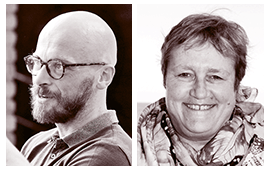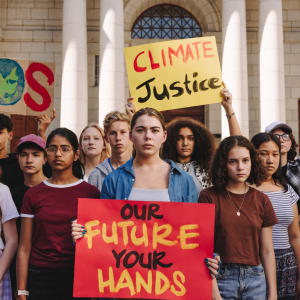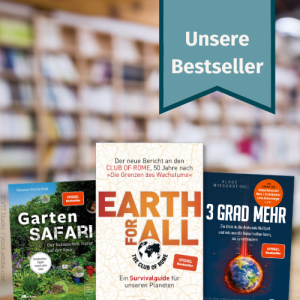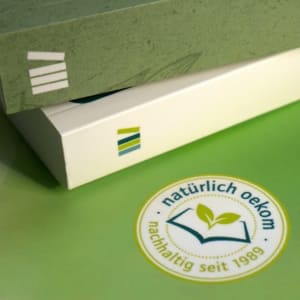GAIA Best Paper Award
With its Best Paper Award, GAIA's Editorial Board honours the best article(s) of the year. The article(s) are selected for their excellence and/or relevance, which are important criteria in sustainability research.
The winner is selected from articles published in GAIA, in the sections Forum and Research. Based on a shortlist drawn up by the Editorial Board, the winner is nominated by a reasoned vote of the members of GAIA’s Scientific Advisory Board.
All Best Papers can be accessed free of charge.
Award Winner 2023

Guido Caniglia and Coleen Vogel are the winners of the GAIA Best Paper Award 2023:
Guido Caniglia, Coleen Vogel: On being oriented. Strengthening transgressive orientations in transdisciplinary sustainability research through queer theory
(GAIA 1/2023)
In addition, GAIA’s Editorial Board gave an honorable mention to:
Rachel Claus, Rachel Davel, Cheryl Heykoop, Daniela Pinto, Brian M. Belcher: How to build Theories of Change for transdisiplinary research: Guidance an considerations (GAIA 1/2023)
Linda Ghirardello, Giulia Isetti: Is tragedy the true language of science? Unleashing the emotional power of theatrical storytelling for climate change communication
(GAIA 3/2023)
Award Winner 2022

Björn Wendt and Jens Köhrsen are the winners of the GAIA Best Paper Award 2022:
Björn Wendt, Jens Köhrsen: Time for change? Zeit als Herausforderung für Nachhaltigkeitspartizipation (GAIA 4/2022)
In addition, GAIA’s Editorial Board gave an honorable mention to:
Tobias Kalt, Johanna Tunn: Shipping the sunshine? A critical research agenda on the global hydrogen transition (GAIA 2/2022)
Christian Schnurr: "Ist das natürlich oder ist da Chemie drin?" Ansätze zu einer transdisziplinären Verständigung über die "(Un-)Natürlichkeit" der Chemie (GAIA 2/2022)
Karoline Augenstein et al.: Wie entfalten Reallabore Wirkung für die Transformation? (GAIA 4/2022)
Award Winner 2021

Jennifer Henze is the winner of the GAIA Best Paper Award 2021:
Jennifer Henze: Zur Wissenschaftlichkeit transdisziplinärer Forschung (GAIA 1/2021)
In addition, GAIA’s Editorial Board gave an honorable mention to:
Markus Leibenath et al.: Naturschutz in Zeiten sozial-ökologischer Transformation: Triebkraft oder Getriebener? (GAIA 3/2021)
Timmo Krüger: Die Energiewende im Kontext von Klima- und Energiekrise (GAIA 3/2021)
Videoinhalte freigeben
Um die Anzeige von externen Podcast- und Video-Inhalten zu aktivieren, ändern Sie bitte Ihre Einstellungen. Der Button befindet sich unter dieser Box.
Alle Informationen zur Datennutzung lesen Sie in unserer Datenschutzerklärung >>.
Award Winner 2020


Livia Fritz and Franziska Meinherz are the winners of the GAIA Best Paper Award 2020:
Livia Fritz, Franziska Meinherz: Tracing power in transdisciplinary sustainability research: an exploration (GAIA 1/2020)
In addition, GAIA’s Editorial Board gave an honorable mention to:
Karoline Augenstein et al.: From niche to mainstream: the dilemmas of scaling up sustainable alternatives (GAIA 3/2020)
Kirsten Twelbeck: Wheat: a powerful crop in US-American culture: Between politics and plant agency (GAIA 4/2020)
Andreas Benz: The greening of the revolution: Changing state views on nature and development in Cuba’s transforming socialism (GAIA 4/2020)
Award Winner 2019

Gregor Hagedorn and colleagues – representing the Scientists for Future – are the winners of the GAIA Best Paper Award 2019. They will receive the award for their article The concerns of the young protesters are justified: A statement by Scientists for Future concerning the protests for more climate protection. Taking seriously the public demand that science should make an active contribution to solving social problems, Hagedorn et al. concisely summarize sound knowledge about the global
challenge of climate change, explain convincingly why scientific research supports the demands of the Fridays for Future movement, and critically reflect on the role of science between neutrality and commitment.
The awarded article is also GAIA’s most popular article 2019 with the highest number of full-text downloads.
The award will be presented at the GAIA Annual Meeting in Zurich on Saturday, March 28, 2020.
In addition, GAIA’s Editorial Board gave an honourable mention to:
- Felix Wagner and Armin Grunwald Reallabore zwischen Beliebtheit und Beliebigkeit: Eine Bestandsaufnahme des transformativen Formats,(GAIA 3/2019)
- Christine Merk et al. Public perceptions of climate engineering: Laypersons’ acceptance at different levels of knowledge and intensities of deliberation, (GAIA 4/2019)
Award Winner 2018


Felix Heidenreich and Harald Heinrichs are the winners of the GAIA Best Paper Award 2018:
- Felix Heidenreich: How Will Sustainability Transform Democracy? Reflections on an Important Dimension of Transformation Sciences (GAIA 4/2018)
- Harald Heinrichs: Sustainability Science with Ozzy Osbourne, Julia Roberts and Ai Weiwei: The Potential of Arts-Based Research for Sustainable Development (GAIA 1/2018)
In addition, GAIA’s Editorial Board gave an honorable mention to:
- Michael Pregernig, Regina Rhodius, Georg Winkel: Design Junctions in Real-World Laboratories: Analyzing Experiences Gained from the Project Knowledge Dialogue Northern Black Forest (GAIA S1/2018)
- Achim Brunnengräber, Tobias Haas: Vom Regen in die Traufe: die sozial-ökologischen Schattenseiten der E-Mobilität (GAIA 3/2018)
- Ulrich Brand, Markus Wissen: What Kind of Great Transformation? The Imperial Mode of Living as a Major Obstacle to Sustainability Politics (GAIA 3/2018)
Award Winner 2017



Wolfgang Krohn, Armin Grunwald and Martina Ukowitz are the winners of the GAIA Best Paper Award 2017:
- Wolfgang Krohn, Armin Grunwald and Martina Ukowitz: Transdisziplinäre Forschung revisited: Erkenntnisinteresse, Forschungsgegenstände, Wissensform und Methodologie (GAIA 4/2017)
In addition, GAIA’s Editorial Board gave an honorable mention to:
- Christian Pohl, Pius Krütli and Michael Stauffacher: Ten Reflective Steps for Rendering Research Societally Relevant (GAIA 1/2017)
- Wolfgang Obergassel, Florian Mersmann and Hanna Wang-Helmreich: Two for One: Integrating the Sustainable Development Agenda with International Climate Policy (GAIA 3/2017)
- Michael Meyen, Maria Karidi, Silja Hartmann, Matthias Weiß, Martin Högl: Der Resilienzdiskurs: Eine Foucault’sche Diskursanalyse (GAIA S1/2017)
Award Winner 2016

Christoph Görg is the winner of the GAIA Best Paper Award 2016:
- Christoph Görg: Zwischen Tagesgeschäft und Erdgeschichte: Die unterschiedlichen Zeitskalen in der Debatte um das Anthropozän (GAIA 1/2016)
In addition, GAIA’s Editorial Board gave an honorable mention to:
- Ulrich Brand: Transformation as a New Critical Orthodoxy: The Strategic Use of the Term »Transformation« does not Prevent Multiple Crises (GAIA 1/2016)
- Katharina Helming, Johanna Ferretti, Katrin Daedlow, Aranka Podhora, Jürgen Kopfmüller, Markus Winkelmann, Jürgen Bertling, Rainer Walz:
- Forschen für nachhaltige Entwicklung: Kriterien für gesellschaftlich verantwortliche Forschungsprozesse (GAIA 3/2016)
Award Winner 2015

Lena Partzsch is the winner of the GAIA Best Paper Award 2015:
- Lena Partzsch: Kein Wandel ohne Macht – Nachhaltigkeitsforschung braucht ein mehrdimensionales Machtverständnis (english translation, author's version here) (GAIA 1/2015)
GAIA’s Editorial Board additionally shortlisted:
- Armin Grunwald: Ökomodernismus ist verantwortungsethisch nicht haltbar (GAIA 4/2015)
- Thomas Jahn, Diana Hummel, Engelbert Schramm: Nachhaltige Wissenschaft im Anthropozän (GAIA 2/2015)
Award Winner 2014

Jens Soentgen and Helena Bilandzic are the winners of the GAIA Best Paper Award 2014:
- Jens Soentgen, Helena Bilandzic: Die Struktur klimaskeptischer Argumente. Verschwörungstheorie als Wissenschaftskritik (GAIA 1/2014)
GAIA's Editorial Board also shortlisted:
- Michael Rosenberger: Die Ratio der »Klima-Religion«. Eine theologisch-ethische Auseinandersetzung mit klimaskeptischen Argumenten (GAIA 2/2014)
- Tilman Santarius: Der Rebound-Effekt: ein blinder Fleck der sozial-ökologischen Gesellschaftstransformation (GAIA 2/2014)
Award Winner 2013

Vaclav Smil is the winner of the GAIA Best Paper Award 2013:
GAIA's Editorial Board also agreed on two second prizes:
















